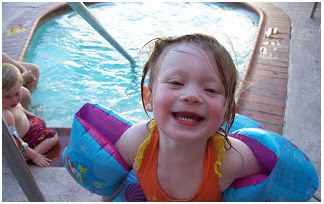New research shows parents are worried children will choose electronic gadgets over swimming at the expense of their health
WASHINGTON, DC — A new Mason-Dixon survey, conducted for the Water Quality and Health Council, found that parents are alarmed at the amount of time children spend on electronic devices at the expense of physical activities like swimming. But experts say parents can help their children strike a balance.The survey found that 94 percent of parents are worried their children are choosing electronic devices over more active pursuits, like swimming. And 93 percent are concerned about the health implications of spending too much time on electronic devices instead of swimming.“Parents are right to be concerned – there are real physical and social consequences from lack of exercise, including the well-documented problem of childhood obesity,” said Dr. Ralph Morris, physician and member of the Water Quality and Health Council. “But the good news is that parents are influential. They can work with their children to strike a balance this summer.”
There is hope: The survey also found that 84 percent of parents would like to see their children swim more often and 88 percent reported having access to a swimming pool. Most parents said their children can swim, including 78 percent of 7 and 8-year-olds, and 89 percent of 9, 10 and 11-year-olds.
Morris discussed the issue as part of a panel with Chris Wiant, Ph.D., chair of the Water Quality and Health Council, and offered tips to parents to help get their children more active this summer.
While preaching to kids doesn’t necessarily work, Morris and Wiant said parents can promote a balance by:
Discussing with your children the health consequences of spending too much time on electronic devices at the expense of more physical pursuits, such as swimming. If children know that sedentary activities have real health impacts, even for children, they may be more motivated to get moving.
Have a family meeting to decide together what the right mix of time is for your family on electronic devices versus swimming and other outdoor activities. Morris said the key is setting goals as a family, and making kids part of the decision-making process.
Ask your children if they would swim more if you made a commitment to get them to a pool on a regular basis. You may be surprised at how readily your children will unplug if given the chance to swim.
Express your interest in spending face-to-face time with your children. Too much time on electronic devices can be socially isolating. Letting your children know that you are also willing to turn off the computer, smart phone and television to have fun with them is an important idea to share.
Locate the municipal or community pool in your area, find out the hours of operation and build in time to get there with your children.
As part of its award winning summer Healthy Pools awareness initiative, the Council is making free pool test kits available to the public. Additionally, a podcast sharing a discussion with a panel of experts is accessible online. To order a kit or listen in on the discussion, go to www.healthypools.org.
“Swimming is not only an all-American way to have fun, swimming is a good form of physical activity. Two-and-a-half hours of water-based (or other forms of) physical activity per week has health benefits across a lifetime," added Michele Hlavsa, chief of the Centers for Disease Control and Prevention’s Healthy Swimming Program.
When asked to prioritize the health benefits of swimming, parents credited swimming with improving children’s cardiovascular health followed by increasing strength and flexibility, developing motor skills, managing weight and managing asthma symptoms. In addition to the 93 percent of parents who are concerned about the health implications of spending too much time on electronic devices instead of swimming, 86 percent are concerned about the impact on children’s social skills.
“Parents are clearly worried that children may be missing out on the health benefits of swimming,” said Thomas M. Lachocki, Ph.D., CEO of the National Swimming Pool Foundation. “Water activities are unique since they are great for children, parents and grandparents. What a great way for generations to connect! It is certainly healthier than having the kids fiddling with controllers and adults fidgeting in recliners.”
One in four respondents did not know that swimming in a well-maintained pool with a proper chlorine level and pH is a healthy activity for children with asthma. More than half of respondents did not know that a well-maintained pool can reduce the risk of swimming-related ear infections and 23 percent did not know that a well-maintained pool can help reduce the risk of developing diarrhea from waterborne germs.
Given a range of choices, more parents chose “the smell of chlorine” as their strongest sensory summertime swimming pool memory but today’s children could be forming more battery-powered summertime memories.
“The sights, sounds and smells of summer are real, not virtual,” said Chris Wiant, Ph.D., Chair of the Water Quality and Health Council. “For children, the distractions of electronic devices are proving to be tough competition for more physical activities like swimming. But it’s clear from this survey that parents want their children to power off and dive in.”
To learn more about the Water Quality and Health Council and its efforts to raise awareness of the importance of disinfection for public health, please visit www.waterandhealth.org.
The survey was conducted of 1,000 adults with at least one child between the ages of 5 and 14 nationwide. The survey was conducted by telephone, including both landlines and cell phones, from May 2 through May 9, 2013 by Mason-Dixon Polling & Research, Inc. The margin for error on the national results is +/-3.2%.
If you liked this article you might enjoy these stories.

0 Response to "5 Tips for Keeping Kids Active this Summer"
Post a Comment